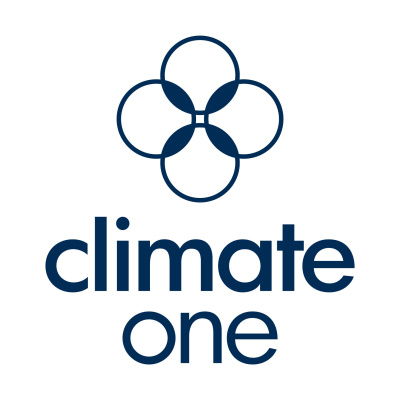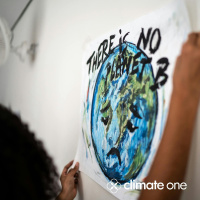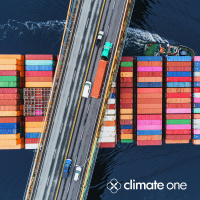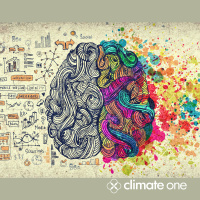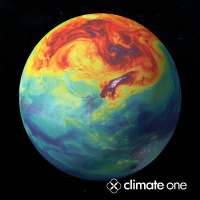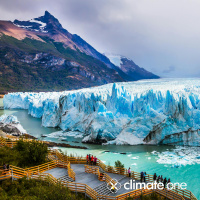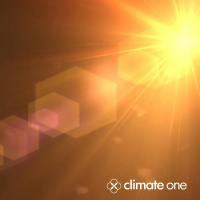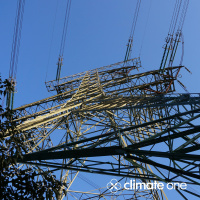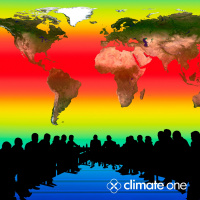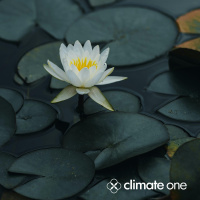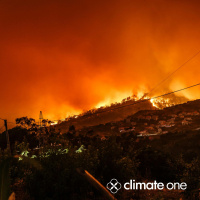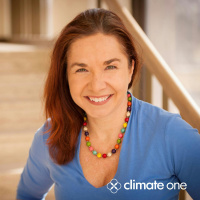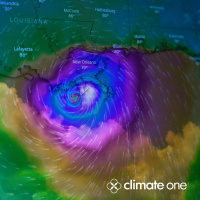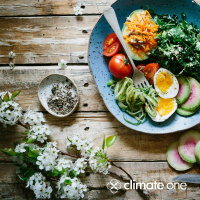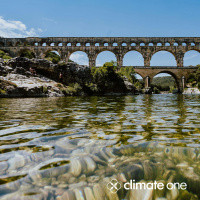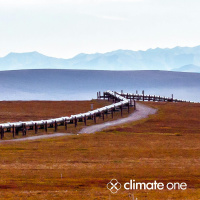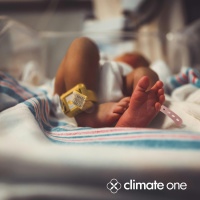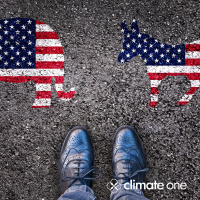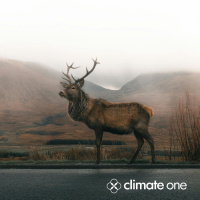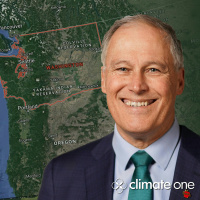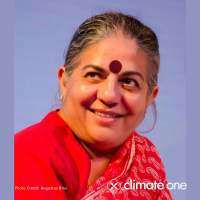Sinopsis
Greg Dalton is changing the conversation on energy, economy and the environment by offering candid discussion from climate scientists, policymakers, activists, and concerned citizens. By gathering inspiring, credible, and compelling information, he provides an essential resource to change-makers looking to make a difference.
Episodios
-
Climate Miseducation
10/12/2021 Duración: 58minClimate change science isn’t taught accurately — or equally — across the country. Investigative reporter Katie Worth dug into textbooks and talked with dozens of children and teachers to find out why. In her book, Miseducation: How Climate is Taught in America, Worth unpacks the influence of the fossil fuel industry, state legislatures and school boards on school curricula in their effort to spread confusion and misinformation about the climate crisis. Some organizations skip the textbook battle entirely and try to reach children directly through assemblies and social media. How do teachers navigate these dynamics in the classroom? How can we ensure our children are learning to be engaged, educated and climate-aware citizens? For transcripts and other information, visit: https://www.climateone.org/watch-and-listen/podcasts Guests: Katie Worth, investigative journalist, author, Miseducation: How Climate is Taught in America Lea Dotson, Campaigner, Action for the Climate Emergency Ann Reid, Executive Director
-
What the Infrastructure Deal Means for Climate
03/12/2021 Duración: 59minPresident Biden recently signed the biggest piece of climate legislation in U.S. history into law. To be sure, the Infrastructure Investment and Jobs Act got pared down significantly from what was first put on the table, but the final measure still contains five times more money for projects aimed at mitigating the climate crisis than the best legislation the Obama administration could get through. What did it take to get 19 Republican senators (not to mention Joe Manchin and Kyrsten Sinema) to vote with the Democrats? And with the states being given great latitude over how to spend the money, will the billions available for highways negate any positive climate impacts? For transcripts and other information, visit: https://www.climateone.org/watch-and-listen/podcasts Guests: Carla Frisch, Principal Deputy Director, Office of Policy, U.S. Department of Energy Sasha Mackler, Executive Director, The Energy Project, Bipartisan Policy Center Beth Osborne, Director, Transportation for America Michael Grunwald, jo
-
REWIND Finding the Heart to Talk About Climate
25/11/2021 Duración: 54minEver have a difficult conversation about climate? Pretty much everyone has. Knowing all the facts and figures only goes so far when talking to someone who just doesn’t agree. So how do we break through the barriers? Scientists trained to present information in a one-way lecture format face a particular challenge: they first need to unlearn old habits. “Everybody's trying to figure out ‘how do we move past this idea that just arming people with facts will lead to a better world,’ right, because we’ve just seen that that’s absolutely not true,” says Faith Kearns, author of Getting to the Heart of Science Communication. Kearns argues that we all need to move from an “information deficit” model of communication – where it’s assumed that the audience simply needs more information – to a relational model, where the science communicator does as much listening as talking in order to first find empathy and common ground. Guests: Faith Kearns, author, Getting to the Heart of Science Communication Katerina Gonzales, do
-
Taking Stock of COP26
19/11/2021 Duración: 01h08minIn 2015, delegates from 196 nations entered into the legally binding treaty on climate change known as the Paris Agreement, which set a goal of limiting global warming to “well below 2 and preferably to 1.5 degrees Celsius compared to pre-industrial levels.” Yet in August of this year, the United Nations Intergovernmental Panel on Climate Change released a new assessment report that starkly illustrated the world’s collective failure to meet that target. Delegates from across the globe have just met in Glasgow for the international climate summit known as COP26, with the hope of strengthening commitments to keep emissions targets at that 1.5 degree level. After two weeks of negotiations, presentations and protests in Glasgow, COP26 is a wrap. This week we discuss what was achieved - and what wasn’t - at the summit. For transcripts and other information, visit: https://www.climateone.org/watch-and-listen/podcasts Guests: Vanessa Nakate, Ugandan climate activist Jiang Lin, Adjunct Professor, University of Cal
-
Climbing, Conservation and Capitalism
12/11/2021 Duración: 55minRick Ridgeway estimates he’s spent about five years of his life sleeping in tents, often in the world’s most remote places alongside fellow outdoor adventure luminaries. Ridgeway worked for Patagonia for 15 years and was behind the company’s infamous “Don’t Buy This Jacket” ad campaign, which paradoxically advocated sustainability and increased sales. Outdoor companies like Patagonia may push for sustainability, but they largely still present a mostly white, wealthy experience with nature, which can be off-putting for people of color. “You know if you can't see yourself in those spaces then it’s hard to feel invited or welcome in that movement,” says writer and social justice facilitator Amanda Machado. What is the role of corporations in conservation? And how can the outdoor industry help make nature more safe, accessible and welcoming for all? For transcripts and other information, visit: https://www.climateone.org/watch-and-listen/podcasts Guests: Rick Ridgeway, former Vice President of Public Engageme
-
Geoengineering: Who Should Control Our Atmosphere?
05/11/2021 Duración: 56minAccording to the latest IPCC Assessment Report, we’re currently on course for at least 3°C (5.4°F) of warming by 2100 even if all of the voluntary Paris Agreement emissions pledges are fulfilled. Clearly the world needs to do more to reduce emissions. But what if that’s still not enough? Solar geoengineering – such as putting sulfate aerosols into the stratosphere to reduce the amount of the sun’s heat from reaching the earth – could be one tool to slow warming temporarily. But it has become so politically fraught that even research into the subject is contentious. Who decides who should control our atmosphere? And what global governance structures should be put in place before any experimentation begins? This program is generously underwritten in part by the Laney and Pasha Thornton Foundation. For transcripts and other information, visit: https://www.climateone.org/watch-and-listen/podcasts Guests: Janos Pasztor, Executive Director, Carnegie Climate Governance Initiative, former Assistant Secretary General,
-
Electrify Everything
29/10/2021 Duración: 59minFully electrifying our homes, cars and industries could cut the amount of total energy we need by half, says Saul Griffith, an entrepreneur, inventor and author of Electrify: An Optimist’s Playbook for Our Clean Energy Future. This electric revolution would mean significantly scaling up our solar, wind and battery storage and reorienting the electric grid – but could also mean “thousands of dollars in savings in every household, every year.” President Biden wants half the cars sold in the US to be electric by 2030. And automakers are increasingly putting money and marketing muscle behind EVs. When Ford announced its all-electric F-150, it sent a powerful jolt through the transportation industry. Pre-orders for the F-150 Lightning surpassed 100,000 within three days, signalling that EVs are no longer just for kale-eating coastal elites. Note: Ford Motor Co. is among Climate One’s sponsors. This program was underwritten in part by ClimateWorks Foundation. For transcripts and other information, visit: https://
-
What’s on Tap at COP26 in Glasgow
22/10/2021 Duración: 56minPeople around the world have been experiencing unprecedented extreme weather events – raging wildfires, killer heatwaves and catastrophic floods. In August, the UN Intergovernmental Panel on Climate Change released a new Assessment Report, which UN Secretary General Antonio Guterres called “code red for humanity,” adding that alarm bells are deafening and the evidence is irrefutable. Against this backdrop, delegates from across the globe are set to convene for the international climate summit known as COP26, where they’re expected to hammer out commitments to reduce carbon emissions in hopes of avoiding the worst impacts of climate disruption. Six years on from the Paris agreement, is there finally enough urgency to turn ambition and promises into action? For transcripts and other information, visit: https://www.climateone.org/watch-and-listen/podcasts Guests: Kate Larsen, Director, International Energy & Climate, Rhodium Group Albert Cheung, Head of Global Analysis, Bloomberg NEF Mitzi Jonelle Tan, Climat
-
Zen and Coping with Climate
15/10/2021 Duración: 54minHow do we manage our own anxiety around an uncertain climate future – let alone help our children work through their feelings and fears? In his latest book, Zen and the Art of Saving the Planet, internationally renowned Zen Master and Nobel Peace Prize nominee Thich Nhat Hahn argues that addressing the intersection of ecological destruction, rising inequality, racial injustice, and the lasting impacts of a devastating pandemic requires us to strengthen our clarity, compassion, and courage to act. “The power of Zen and the power of mindfulness is that it roots us in the present moment so we can be alert to what is going on, we can be responsive, we can be the master of our mind and awareness in any given situation,” including climate disruption, says Sister True Dedication, contributor and editor of Thich Nhat Hahn’s book. Psychotherapist Leslie Davenport, author of All the Feelings Under the Sun: How to Deal With Climate Change, provides thoughtful, practical exercises to help young readers process their fee
-
Firefight: How to Live in the Pyrocene
08/10/2021 Duración: 59minWe’ve experienced yet another summer of record wildfires in the western U.S., endangering lives, displacing communities, and sending unhealthy smoke across the nation. The science is clear: human-caused climate change is making lands more conducive to burning, and we are increasingly living in flammable landscapes. Forest experts say there are tools to help reduce the risk of catastrophic fires, keep forests alive as valuable carbon sinks and make communities more resilient to megafires. But we may also have to become accustomed to more fire – and smoke – in our lives. How can we better live with fire, including using it as a tool, rather than always fighting it? For transcripts and other information, visit: https://www.climateone.org/watch-and-listen/podcasts Guests: Stephen Pyne, author, The Pyrocene: How We Created an Age of Fire, and What Happens Next Susan Husari, member of the California Board of Forestry and Fire Protection Chad T. Hanson, author, Smokescreen: Debunking Wildfire Myths to Save Our F
-
Katharine Hayhoe on Hope and Healing
01/10/2021 Duración: 58minDespite her identity as an evangelical, climate scientist Katharine Hayhoe doesn't accept global warming on faith; she crunches the data, analyzes the models, and helps engineers, city managers and ecologists quantify the impacts. In her new book, Saving Us: A Climate Scientist’s Case for Hope and Healing in a Divided World, Hayhoe argues that when it comes to changing hearts and minds, facts are only one part of the equation. “The biggest problem we have is not the people who willfully decide to reject 200 years of basic science,” she says. “The bigger problem is the number of people who say, ‘it's real’ but they don’t think it matters to them.” Hayhoe says we need to find shared values with others to drive conversations and collective action on climate disruption. Guest: Katharine Hayhoe, climate scientist and chief scientist, The Nature Conservancy; author, Saving Us: A Climate Scientist’s Case for Hope and Healing in a Divided World Learn more about your ad choices. Visit megaphone.fm/adchoices
-
Preparing for Disasters We Don’t Want to Think About
24/09/2021 Duración: 01h40sThe COVID-19 pandemic revealed structural weaknesses and inequities that existed long before 2020. Like COVID-19, climate change is another “threat multiplier,” with the power to disrupt many of our social systems. In her new book, The Fight for Climate After COVID-19, Alice Hill says we need to adapt our thinking and our policies to combat the ever-increasing threat of climate change. Especially when we see more compound disasters – like a wildfire followed by a mudslide. “We need to come together to understand the risks, understand the vulnerabilities and then start making decisions with the support and the aid of the federal government to have better outcomes,” Hill says. What changes can we make now to better prepare for future risks and climate disasters? Guests: Alice Hill, author, The Fight for Climate After COVID-19, Senior Fellow for Climate Change Policy, Council on Foreign Relations Lt. Gen. (Ret.) Thomas P. Bostick, Former Commanding General, U.S. Army Corps of Engineers Francis Suarez, Mayor
-
Diet for a Threatened Planet
17/09/2021 Duración: 59minThis September marks the 50th anniversary of the seminal work Diet for a Small Planet, in which Frances Moore Lappé argued that cattle constitute “a protein factory in reverse.” Lappé’s book inspired countless people to adopt vegetarian diets for environmental reasons. But in the last 50 years the industrial food systems in America have only grown bigger and more concentrated, and – as the Lappés would argue – more powerful. Together with her daughter Anna Lappé, author of Diet for a Hot Planet, the two now focus on the intersections between democracy, environment, food, and justice. “It's really important that we understand that in order to change our food environment, we need to really work to get money out of politics, and we really need to work on how to take on that kind of consolidated power in the industry,” Anna Lappé says. Guests: Frances Moore Lappé, author, Diet for a Small Planet Anna Lappé, author, Diet for a Hot Planet Analena Hope Hassberg, Associate Professor, Ethnic and Women's Studies D
-
Water and Civilization: Resilience and Collapse
10/09/2021 Duración: 59minWater is essential for life, and throughout history we have sought to control and make use of it. As Giulio Boccaletti explores in his new book, Water: A Biography, that relationship with water has underpinned human civilization, forming an integral part of society, government and land use systems. But despite its essential nature, access to water has never been equal or entirely fair. Climate disruption will further destabilize the systems we’ve built to control water in our environment – even as it remains a public good without fair and equal public access. What can 10,000 years of history teach us about how we should handle water in our current and future climate? Guests: Giulio Boccaletti, Author, Water: A Biography Sara Aminzadeh, Vice President of Partnerships, U.S. Water Alliance Learn more about your ad choices. Visit megaphone.fm/adchoices
-
The Fight Over Pipelines
03/09/2021 Duración: 54minHundreds of people have been arrested in Minnesota in ongoing protests against Line 3, a pipeline that will move Canadian tar sands oil, and which could be operational as soon as this month. Pipeline advocates, like Mike Fernandez of Enbridge (Line 3’s builder), argue that as long as people are still using oil, we need a way to transport it — and pipelines are the safest, least carbon-intensive means of doing so. Opponents, like Sierra Club’s Kelly Sheehan Martin, argue that oil companies bolster markets for oil and gas as a way to justify continued profits from building pipelines and extracting oil. Sheehan Martin argues that to seriously address the climate crisis, we need to keep the oil in the ground, and listen to the voices of those worried about harm to waterways and tribal lands. Why have oil pipelines become such a point of contention in the environmental movement? And what can all sides agree on to work toward the same less-carbon-reliant future? Guests: Mike Fernandez, Senior Vice President, Publ
-
Should We Have Children in a Climate Emergency?
27/08/2021 Duración: 57minListener Advisory: This episode contains some content related to a suicide. If you or someone you love is thinking about suicide, the National 24-hour Suicide Prevention Lifeline is 1-800-273-8255. This summer, the climate crisis seems to be unfolding faster than ever before — with catastrophic floods, huge wildfires, and killer heat. It’s becoming increasingly hard to mentally set climate aside as a future problem — it is here, real in our present moment. How do we grapple with the weight of these changes, and process our fear for what is coming for us, and for the next generation? And how do those emotions affect our decisions about whether or not to have children, who in many ways represent an embodied version of our hope for the future? Guests: Daniel Sherrell, Author, Warmth, Coming of Age at the End of Our World Seb Gould, physics teacher Irène Mathieu, pediatrician and poet Virginie Le Masson, co-director of the Centre for Gender and Disaster at University College London Learn more about your ad choic
-
Which Way Are Swing Voters Swinging on Climate?
20/08/2021 Duración: 56minIn early August, the Intergovernmental Panel on Climate Change released a report unequivocally connecting global warming and extreme weather to human-driven greenhouse gas emissions, and warning of much more dramatic climate futures if we don’t change course soon. Since the 2020 election, Rich Thau’s Swing Voter Project has been querying those who shifted from Trump in 2016 to Biden in 2020 about a range of issues. How will their views affect the 2022 midterms and the 2024 election? Where does climate rate on their list of issues? And does the accelerating climate crisis matter enough to affect their votes? Guests: Rich Thau, Moderator, The Swing Voter Project; Co-founder and President, Engagious Andrew Freedman, Climate and Energy Reporter, Axios Venkatachalam “Ram” Ramaswamy, Director of NOAA’s Geophysical Fluid Dynamics Laboratory Learn more about your ad choices. Visit megaphone.fm/adchoices
-
30x30: This Land Is Whose Land?
13/08/2021 Duración: 54minIn October 2020, California Gov. Newsom announced a plan to protect 30% of his state by 2030. In 2021, the Biden Administration announced its own 30x30 plan, later dubbed America the Beautiful. With 12% of the U.S. already under some form of protection, where will the other 18% come from? In states like Nebraska, nearly all the land is in private hands — and the owners are worried. With increased focus on the climate crisis, it’s easy to think we have enough to worry about without considering species other than our own. But the natural world provides critical resources that counteract the damaging impacts of climate change and sustain all life — including human life. About one million animal and plant species are now threatened with extinction. How much land does nature need to survive? Guests: Paula Ehrlich, CEO, E.O. Wilson Biodiversity Foundation Woody Lee, Executive Director, Utah Diné Bikéyah Jennifer Norris, Deputy Secretary for Biodiversity and Habitat, California Natural Resources Agency Catherine Sem
-
Jay Inslee, BP and Washington’s Climate Story
06/08/2021 Duración: 01h03minIn Washington State, voters defeated initiatives to put a price on carbon ― twice. Governor Jay Inslee himself then lost his personal bid for the White House. Yet his bold ideas have proven staying power. The state legislature recently passed a carbon cap and invest bill that will reduce economy-wide greenhouse gas emissions 95 percent by 2050. “We’ve got to wake up every morning figuring out ‘how can I disrupt the status quo.’ Because the status quo is deadly, it’s fatal, it will destroy economies and the biology that we exist on,” Inlsee says. Even big oil, which spent tens of missions to defeat the 2018 carbon pricing proposal, seems to be changing its tune, with BP now supporting a price on carbon. How might Washington State be a bellwether for Washington DC? Learn more about your ad choices. Visit megaphone.fm/adchoices
-
Vandana Shiva and the Hubris of Manipulating Nature
30/07/2021 Duración: 53minFrom clearing land for pasture to building dams, humans have long changed the face of the Earth. But Indian eco-feminist Vandana Shiva is highly critical of how we’ve changed our relationship with the land through industrial monocrop agriculture. She firmly opposes genetically modified crops, and has called seed patents “bio-piracy.” But it’s not just the technology she’s critical of. “I’m critical of the world view of arrogance. The worldview that came with colonialism, the mechanistic mindset of the conquering man being the creator of the earth and creator of the wealth,” Shiva says. Shiva argues for a renewed focus on biodiversity and regenerative agriculture to help solve the climate crisis. Guests: Vandana Shiva, director of the Foundation for Science, Technology & Ecology Learn more about your ad choices. Visit megaphone.fm/adchoices
